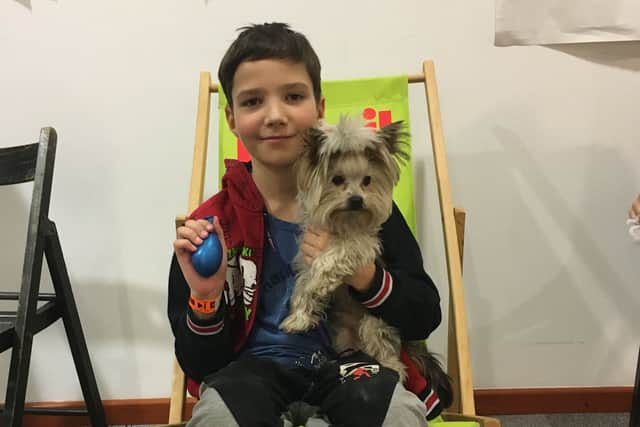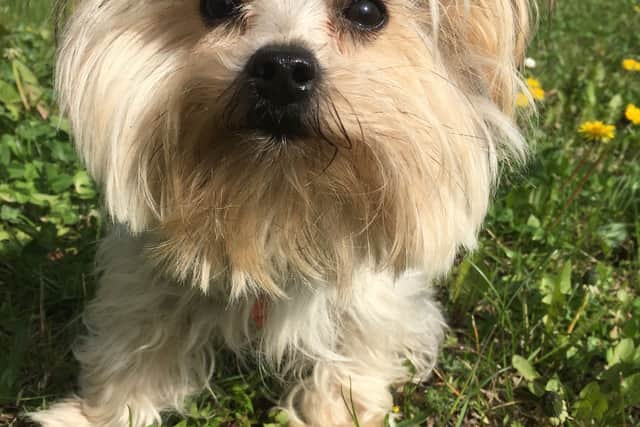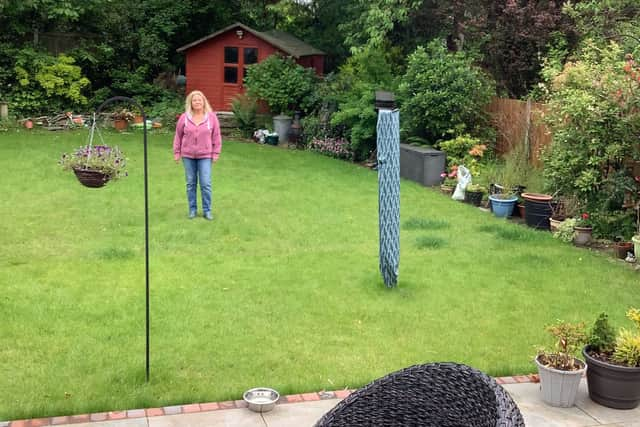Ukrainian family had ‘lost hope’ of coming to UK after prolonged pet quarantine delays
and live on Freeview channel 276
A Ukrainian family trying to get to Merseyside and their British sponsor have raised concerns about the system of getting pets into the country as they have struggled to organise travel for their beloved family dog.
Inna Oleksiienko and her sons Denys, 17 and Misha, 10, received visas to travel to England at the end of April after escaping a missile strike on their home town, but are still waiting in Warsaw, Poland, due to red tape around Ukrainian pet import applications.
Advertisement
Hide AdAdvertisement
Hide AdThey are currently staying in a hostel with their two-year-old Yorkshire Terrier Oscar, who they say is a member of their family they ‘could never leave’.


The family have been living in a Polish hostel for three months and waiting for their pet import application for Oscar to be processed in the UK after receiving their visas a month ago.
Their Merseyside sponsor, Susan Tootill, who lives in Formby, has also been waiting for an Animal and Plant Health Agency (APHA) approved vet to give her UK home the green light to offer ‘home isolation’ to Oscar.
In March, the Department for Environment and Rural Affairs (Defra) announced that using an emergency licence, people fleeing Ukraine can bring their pets to the UK with any quarantine, vaccination and microchipping costs met by the Government.
Advertisement
Hide AdAdvertisement
Hide AdThe APHA was due to provide ‘quick licence approvals and quarantine arrangements to avoid creating additional burdens or delays’.
However, APHA said it is experiencing a ‘high volume’ of emergency licence applications for pets and due to high demand applications may take longer than usual to be processed.


‘As a sponsor you cannot help feeling responsible’
Susan Tootill and her husband Bernard, have offered Inna and her sons, along with dog Oscar, accommodation in her home and access to a large, fenced and gated garden.
She said: “I know APHA has been given a difficult job but I was gobsmacked to be told a an APHA superintendent veterinary inspector would have to check my home was suitable.
Advertisement
Hide AdAdvertisement
Hide Ad“APHA told me the requirements of licence issuing have been reached by the Ukrainian family, but it has all been held up because of the home assessment.
“My family have had their own visas a month now, and complied with all requirements for their dog because nobody wants rabies in the country.”
Mrs Tootill has had to cancel charity transport from the Ukraine to Merseyside for the family twice due to waiting on the APHA licence.


She said: “As a sponsor you cannot help feeling responsible and it’s the sponsor that has to deal with giving the family the bad news that they do not want to hear. It’s very emotional as the Ukranian family want to get to a place of safety where they can hopefully settle for a while.
“We’re not the only ones this has been happening to.
Advertisement
Hide AdAdvertisement
Hide Ad“The other difficulty with the travel is also down to the narrow time allowed. The dog must travel 24 hours post tapeworm treatment - and have proof of receiving it - but no longer than 120 hours. Trying to get transport to fit with this is not easy.
“I have sent photographs of my garden to APHA.
“I was devastated when Inna said she was losing hope and that she would have to return to Ukraine, as she could not see any alternative.
“We have received a letter today from an inspector asking us for more information before a licence is issued.
“We are not giving up hope we know Inna and her family, including Oscar their Yorkshire Terrier will get here.
Advertisement
Hide AdAdvertisement
Hide Ad“My Ukrainian family’s dog complies with all regulations and APHA have admitted that the ‘hold up’ has been with them.”
Bill Esterson, Labour MP for Sefton Central and his team have been trying to help Mrs Tootill by liaising with Defra.
He said: “This looks like another example of the government putting rules in place without making sure they have the staff able to help people in a timely fashion to reach the sanctuary that they have been offered by generous people in this country.”
Escape from Ukraine
Ms Oleksiienko and her sons left their small town, Bila Tserkva, in the Kyiv region, on March 13 after a missile strike.
Advertisement
Hide AdAdvertisement
Hide AdShe said: “At the beginning of the war my children escaped to the village to their grandma. I became a volunteer in my school, where I worked as a teacher. I helped our army and with other people weaved camouflage nets.


“But after the missile strike I decided to escape to Poland. A lot of people tried to escape with their families, but we tried and got into the train carriage.
“When we got inside there weren’t any spare place and we were sitting on our suitcases all the way to Lviv. It’s almost ten hours.
“It was a terrible experience, because we weren’t allowed to use any lights or even mobile phones, because of camouflage mode.
Advertisement
Hide AdAdvertisement
Hide Ad“Our dog was exhausted and frightened too. In the morning one of the passengers of our evacuation train came to me and said that she thought that our dog was huge because he breathed heavily.
“When we arrived we saw many women and children. They were standing in a long queue and waiting for a train to Poland. By this train we arrived to the Ukrainian-Poland border.
“We walked a really long distance with our suitcase and dog.


“There were also many Ukrainian refugees and it took us about three to four hours to cross the border.
Advertisement
Hide AdAdvertisement
Hide Ad“But when we crossed the border we met Polish volunteers. They gave us food and hot tea.
“It was really moving. Then they helped us to find a bus to Warsaw. We traveled to our hostel. It was nearly midnight when we got there. We were too exhausted and tired, but we were safe.
“Volunteers gave us all necessary things and accommodation. Now we are still living in a hostel in a room without locks.
“We felt happy when we received all the visas quickly.
“We had all necessary vaccinations for our dog, microchip, blood tests. But we are still waiting for license from APHA and at one point we lost hope.
Advertisement
Hide AdAdvertisement
Hide Ad“We decided we would return to Ukraine if we didn’t get the licence because Oscar is a member of our family. We can’t travel without him.
“Our host family are really friendly and helpful people. They have done everything they can to make this process quicker. We really appreciate their help.”
An APHA spokesperson said: “We have been working through the Veterinary Delivery Partnership contractors and their network of veterinary practices in England to bolster support for home isolation visits and regular monitoring of the pet during the rabies monitoring period.
“We continue to work as quickly as possible to process Ukrainian pet import applications and will contact people as soon as their application is approved.”
What are the rules around bringing pets to the UK from Ukraine?
Advertisement
Hide AdAdvertisement
Hide AdAccording to Defra and APHA, if you are from Ukraine and are seeking refuge in the UK, you can bring your pet dog, cat or ferret without it going into quarantine or isolation if it has:
- been vaccinated against rabies and had a blood test 30 days later to confirm the vaccine worked, and waited 3 months after the blood test to travel to the UK
- been microchipped
- a pet passport or health certificate issued before you left Ukraine
- had tapeworm treatment
You will need a licence to bring your pet to the UK if your pet:
- does not meet all these requirements
- meets these requirements, but you do not have proof that it does
- has been issued with an EU pet passport since leaving Ukraine
Before travel, the APHA emails a licence form for the pet, which needs to be returned.
Depending on the pet’s vaccines, APHA may then send out a home isolation form asking about the home where the Ukrainian refugees and their pets will be staying.
Advertisement
Hide AdAdvertisement
Hide AdThe form then has to be filled in by the UK host and the Ukrainian owners.
It is at that point that APHA will email to say whether the pet needs to go into quarantine, isolation kennels or home isolation when it arrives in the UK and will email a licence.
Quarantine for pets from Ukraine can be up to four months as it is an ‘unlisted country’ for rabies.
The APHA said pets are being considered on a ‘case by case basis’ and that that home isolation requires the home to meet a very high standard of requirements including ensuring that the pet cannot escape, that there is no risk to other animals or to people, whilst also providing acceptable welfare needs.
Comment Guidelines
National World encourages reader discussion on our stories. User feedback, insights and back-and-forth exchanges add a rich layer of context to reporting. Please review our Community Guidelines before commenting.